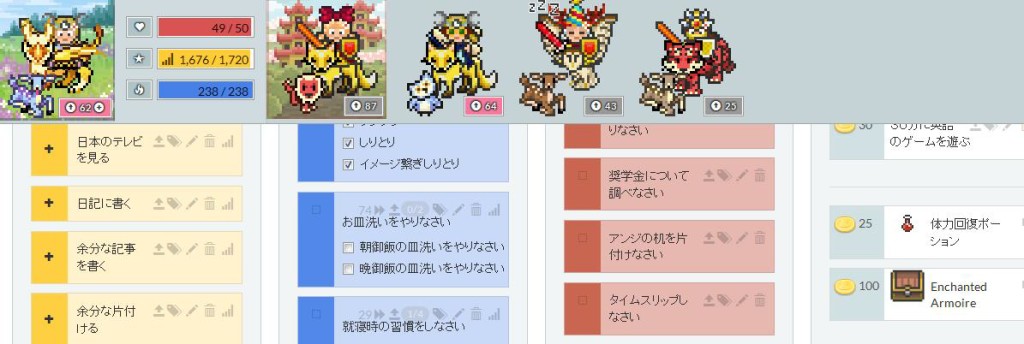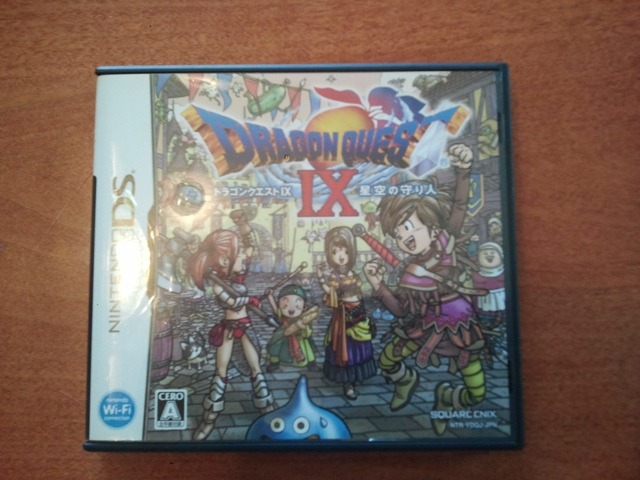I have now been using HabitRPG for almost a year now, and it continues to be useful for me in my Japanese studies and in general. Some recent changes have made HabitRPG even more useful than it was before. We have written various articles about HabitRPG on this site, and Cure Dolly has previously written a very helpful article explaining this application.
 One of the most important of these changes is that there is a Japanese translation available now. Of course, switching over to Japanese gives us the usual advantages of having one’s computer and applications in Japanese. Because HabitRPG is a role-playing game as well as a productivity application, this also gives many of the advantages of playing games in Japanese. Many of the Quests are written in Japanese, and all of the pets, mounts, food, equipment and other items are listed in Japanese. This is excellent for reinforcing important vocabulary on a daily basis. For example, from feeding Pets in my Japanese HabitRPG, I now can recognize the word じゃがいも as potato, a word I frequently failed in my Anki.
One of the most important of these changes is that there is a Japanese translation available now. Of course, switching over to Japanese gives us the usual advantages of having one’s computer and applications in Japanese. Because HabitRPG is a role-playing game as well as a productivity application, this also gives many of the advantages of playing games in Japanese. Many of the Quests are written in Japanese, and all of the pets, mounts, food, equipment and other items are listed in Japanese. This is excellent for reinforcing important vocabulary on a daily basis. For example, from feeding Pets in my Japanese HabitRPG, I now can recognize the word じゃがいも as potato, a word I frequently failed in my Anki.
Another very useful change is that Habits now count for damage against Quest Bosses. Previously, only Dailies and Todos would do damage to Quest Bosses. While it is certainly helpful to make immersion activities such as listening, reading, and watching Anime into Dailies, for many of these activities, one really wants to do as much as possible. With a Daily, once it is checked off, it is checked off for the day; one can not get credit for doing more than is required by the Daily. Habits can be clicked as many times a day as they are done. Of course, one always received Experience and Gold from Habits, I (and my party mates) have found that doing damage against a Quest Boss is extremely motivating, so having Habits “count” is a really wonderful change.
Habits are also good for immersion activities that are important but should not become a chore. HabitRPG punishes us for undone Dailies by dealing damage at our cron (the time we set for the beginning of the new day). When we are on a Boss Quest, the Boss does damage to the entire party, so it particularly important to do the Dailies on those days. For myself, there are certain immersion activities that I want to keep as optional, so that they psychologically remain leisure activities. For myself, some of those examples are reading novels, reading manga, and playing games. Now that Habits “count” against Bosses, I have more incentive to do those できるだけ (as much as possible).
Another exciting new feature is the Enchanted Armoire, which solved a huge difficulty with HabitRPG for long term use. The difficulty was that eventually one would buy up all of the available equipment, and Gold would become meaningless. One could forestall that trouble for a time by switching classes and buying up the equipment for all of the classes; however, sooner or later, one would reach the point of Gold losing its motivational value. Now, the developers created the Enchanted Armoire, which for 100 Gold Pieces randomly gives special items, experience points, or food.

Another wonderful change is the brand new option of creating Dailies which will become due in a certain number of days. Before one could only create Dailies that were due on specific days of the week. While the “number of days” option is not specifically useful to me with respect to my Japanese studies, it is useful for my other responsibilities, such as paying the rent and other bills, which are due on a monthly basis.
Oh yes, and the Japanese Deep Cave Adventures’ Guild is still going strong, and we are still playing Shiritori.


 The basic theory is that using Japanese gives me bonuses via positive Habits, and I have to pay to use English using Rewards. I started this with video games, but I have extended this to other areas as well. I can play a game for a half of an hour in Japanese for 5 Gold pieces, and I can get one to three “pluses” under my positive Habit of “extra Japanese,” depending on how much Japanese I had to use in the game. In a role-playing game, such as Dragonquest IX, I can get 3 “pluses” if I have to get through a long plot line or a talk to a lot of people in a town to find out what to do next. I only get one if I spend the entire time fighting monsters in a dungeon, and I get two “pluses” for anything in between. To play a game in English, it costs me 30 Gold pieces to play for the same half of an hour, and there are no available rewards for doing so. So, I can play a game in English if I really want to, but…
The basic theory is that using Japanese gives me bonuses via positive Habits, and I have to pay to use English using Rewards. I started this with video games, but I have extended this to other areas as well. I can play a game for a half of an hour in Japanese for 5 Gold pieces, and I can get one to three “pluses” under my positive Habit of “extra Japanese,” depending on how much Japanese I had to use in the game. In a role-playing game, such as Dragonquest IX, I can get 3 “pluses” if I have to get through a long plot line or a talk to a lot of people in a town to find out what to do next. I only get one if I spend the entire time fighting monsters in a dungeon, and I get two “pluses” for anything in between. To play a game in English, it costs me 30 Gold pieces to play for the same half of an hour, and there are no available rewards for doing so. So, I can play a game in English if I really want to, but…